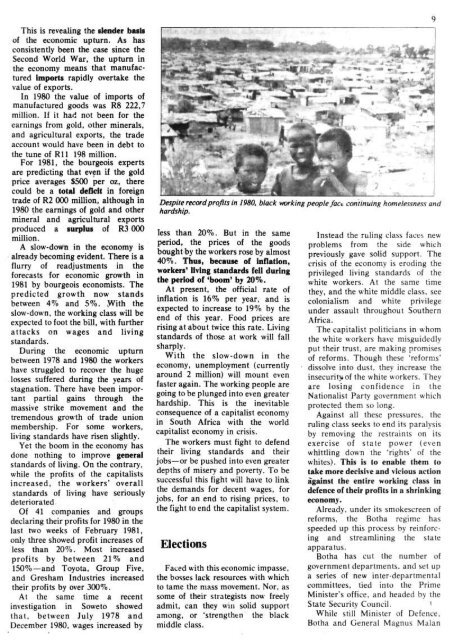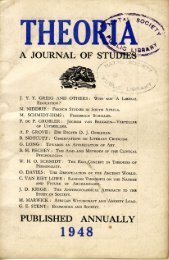Inqaba ya basebenzi Number 2 April 1981 - DISA
Inqaba ya basebenzi Number 2 April 1981 - DISA
Inqaba ya basebenzi Number 2 April 1981 - DISA
Create successful ePaper yourself
Turn your PDF publications into a flip-book with our unique Google optimized e-Paper software.
This is revealing the slender bull<br />
of the economic upturn. As has<br />
consistently been the case since the<br />
Second World War. the upturn in<br />
the economy means that manufactured<br />
Imports rapidly overtake the<br />
value of exports.<br />
In 1980 the value of imports of<br />
manufactured goods was R8 222.7<br />
million. If it had not been for the<br />
earnings from gold, other minerals,<br />
and agricultural exports, the trade<br />
account would have been in debt to<br />
the tune of Rll 198 million.<br />
For <strong>1981</strong>, the bourgeois experts<br />
are predicting that even if the gold<br />
price averages $500 per oz, there<br />
could be a total deficit in foreign<br />
trade of R2 000 million, although in<br />
1980 the earnings of gold and other<br />
mineral and agricultural exports<br />
produced a surplus of R3 000<br />
million.<br />
A slow-down in the economy is<br />
already becoming evident. There is a<br />
flurry of readjustments in the<br />
forecasts for economic growth in<br />
<strong>1981</strong> by bourgeois economists. The<br />
predicted growth now stands<br />
between 4% and 5%. With the<br />
slow-down, the working class will be<br />
expected to foot the bill, with further<br />
attacks on wages and living<br />
standards.<br />
During the economic upturn<br />
between 1978 and 1980 the workers<br />
have struggled to recover the huge<br />
losses suffered during the years of<br />
stagnation. There have been important<br />
partial gains through the<br />
massive strike movement and the<br />
tremendous growth of trade union<br />
membership. For some workers,<br />
living standards have risen slightly.<br />
Yet the boom in the economy has<br />
done nothing to improve general<br />
standards of living. On the contrary,<br />
while the profits of the capitalists<br />
increased, the workers' overall<br />
standards of living have seriously<br />
deteriorated<br />
Of 41 companies and groups<br />
declaring their profits for 1980 in the<br />
last two weeks of February <strong>1981</strong>.<br />
only three showed profit increases of<br />
less than 20%. Most increased<br />
profits by between 21% and<br />
150%—and Toyota. Group Five,<br />
and Gresham Industries increased<br />
their profits by over 300%.<br />
At the same time a recent<br />
investigation in Soweto showed<br />
thai, between July 1978 and<br />
December 1980. wages increased by<br />
Despite record profits in 1980, black working people fact continuing hometessness an<br />
hardship.<br />
less than 20%. But in the same<br />
period, the prices of the goods<br />
bought by the workers rose by almost<br />
40%. Thus, because of Inflation,<br />
workers' living standards fell during<br />
the period of 'boom' by 20%.<br />
At present, the official rate of<br />
inflation is 16% per year, and is<br />
expected to increase to 19% by the<br />
end of this year. Food prices are<br />
rising at about twice this rate. Living<br />
standards of those at work will fall<br />
sharply.<br />
With the slow-down in the<br />
economy, unemployment (currently<br />
around 2 million) will mount even<br />
faster again. The working people are<br />
going to be plunged into even greater<br />
hardship. This is the inevitable<br />
consequence of a capitalist economy<br />
in South Africa with the world<br />
capitalist economy in crisis.<br />
The workers must fight to defend<br />
their living standards and their<br />
jobs—or be pushed into even greater<br />
depths of misery and poverty. To be<br />
successful this fight will have to link<br />
the demands for decent wages, for<br />
jobs, for an end to rising prices, to<br />
the fight to end the capitalist system.<br />
Elections<br />
Faced with this economic impasse,<br />
the bosses lack resources with which<br />
to tame the mass movement. Nor, as<br />
some of their strategists now freely<br />
admit, can they win solid support<br />
among, or 'strengthen the black<br />
middle class.<br />
Instead the ruling class faces new<br />
problems from the side which<br />
previously gave solid support. The<br />
crisis of the economy is eroding the<br />
privileged living standards of the<br />
white workers. At the same time<br />
they, and the white middle class, see<br />
colonialism and white privilege<br />
under assault throughout Southern<br />
Africa.<br />
The capitalist politicians in whom<br />
the white workers have misguidedly<br />
put their trust, are making promises<br />
of reforms. Though these 'reforms'<br />
dissolve into dust, they increase the<br />
insecurity of the white workers. They<br />
are losing confidence in the<br />
Nationalist Party government which<br />
protected them so long.<br />
Against all these pressures, the<br />
ruling class seeks to end its paralysis<br />
by removing the restraints on its<br />
exercise of state power (even<br />
whittling down the 'rights' of the<br />
whites). This Is to enable them to<br />
take more decisive and vicious action<br />
against the entire working class in<br />
defence of their profits in a shrinking<br />
economy.<br />
Already, under its smokescreen of<br />
reforms, the Botha regime has<br />
speeded up this process by reinforcing<br />
and streamlining the slate<br />
apparatus.<br />
Botha has cut the number of<br />
government departments, and set up<br />
a series of new inter-departmental<br />
committees, tied into the Prime<br />
Minister's office, and headed by the<br />
State Security Council.<br />
While still Minister of Defence.<br />
Botha and General Magnus Malan
















